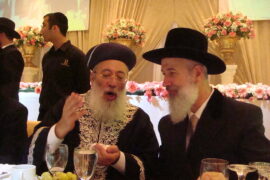Controversial freshman lawmaker Itamar Ben-Gvir (Otzma Yehudit) seems to have tapped into a powerful current that runs deep in Israeli society. His unique vantage point as someone raised in a home identified as “masorti” (“traditional”) or “ḥiloni” (“secular”) but over time came to identify as dati (“observant”) or ḥaredi (“ultra-Orthodox”).
Asked on the subject in a recent interview, Ben-Gvir had this to say:
“I do not like the phrase ‘hiloni’ because where does it come from? Ḥol [mundane, profane]. Is my brother ḥol? Are my parents ḥol? My mother was a captain [in the Israeli army], my father was in every Israeli war, my brother settled the Negev. They are holy.”
It’s possible that Ben-Gvir inadvertently opened up a conversation about “ḥiloniut” – or “secularism” – as an identity and its relevance to modern Jewish life.
The English term “secular” comes from the Latin seaculum, meaning era. According to a dualistic Western perspective, man and his domain are separated from the Creator and His realm, expressed through the existence of time in the former but not the latter.
Hence, “secular” means being bound by time and separated from the holy.
The first person to describe themselves as “secular,” adopting the term as a personal identity, was British Enlightenment writer George Holyoake in 1851. It’s unclear who was the first person to do the same with the Hebrew “ḥiloni,” similarly derived from the word ḥol as Ben-Gvir accurately described, but for the entirety of the state’s existence, self-described ḥilonim have made up a significant component of Israel’s population.
Simply looking at the terms “secular” and “ḥiloni” – together with their historical and etymological origins – it becomes easy to see that the concept has no place in authentic Jewish discourse. Western civilization, however, is founded on a base of dualistic Aristotelian logic and backed up by the traditional Christian system of a small, isolated, abstemious clergy class and a large, indulgent, profane, layman class.
Hebrew thought rejects such dichotomies while championing a panentheist understanding of reality that sees the inherent holiness in all things. It is simply not possible for anything to be truly ḥol, mundane or profane, because everything that exists was created by and ultimately is an expression of HaShem. This is all the more true for the nation of Israel, “and you shall all be holy people to Me” (Sh’mot 22:30).
The rabbinic class may be more knowledgeable than the general Jewish population, but they are no more holy. The Kohanim and Levi’im do holy work in the Temple, but they do so as custodians of the Temple for the people’s sake.
All Jews are fundamentally expressions of Klal Yisrael, the Israeli collective soul. Collectivism in Hebrew thought also differs greatly from collectivism in Western thought, as explained by HaRav Zvi Yehuda HaKohen Kook:
“Occasionally, people ask what is the meaning of ‘Klal’? They claim that the Klal is the sum total of individual components or a gathering of all the individual parts of the whole. There aren’t proper words to reject this conception. This is a materialistic viewpoint, which lacks intellectual depth. The understanding of the Klal is not the gathering together of the individual parts of the nation. Rather, the Klal is a Divine creation, a fundamental Divine formation which reveals itself, superficially, in its physical aspect, in a multiplication of parts [individual Jews]. This understanding is vitally connected to the foundations of emuna and to its most essential principles.” (Siḥot Rav Zvi Yehuda)
Klal Yisrael presupposes the existence of individual Jews, who are merely the physical, superficial expressions of the Klal. The Klal is the direct emissary of HaShem, tasked with realizing His visions and fulfilling His ideals.
“A man’s emissary is like himself.” (Kiddushin 42b)
Klal Yisrael is likewise held in similar spiritual regard as its principal – the Creator. The entire collective from which all individual Jews are expressed is fundamentally and uniquely holy.
It is impossible, then, for any individual Jew to be unholy. Every Jew is fundamentally an expression of Klal Yisrael, a tie nothing can sever, and is therefore fundamentally holy. When philanthropist George Rohr reported to the Lubavitcher Rebbe on his organization of Rosh HaShana services for what he called “Jews with no Jewish background,” the Rebbe withheld his approval.
“What? No Jewish background?” the Rebbe retorted, “Go back and tell them they have a background. They are the children of Avraham, Yitzḥak, Yaakov, Sarah, Rivka, Raḥel, and Leah!”
For a Jew to be called or to call himself ḥiloni, ḥol, unholy, is tragic and false. At best, it is the unsavory importation of Western ideology into Jewish society and at worst it is a fundamental devaluation or rejection of one’s Jewishness.
Every Jew is an expression of Klal Yisrael – HaShem’s emissary to our world. Every Jew is holy.





